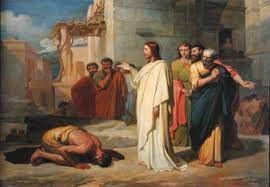The Introduction
Luke loves this kind of story. Jesus straddles the border between Samaria and Galilee when he heals some folks. This means we don’t know how many in this leper band were Jews, how many were foreigners. But we do know only one Samaritan shows gratitude. Luke celebrates the unlikely hero: foreigners, sinners, women, the poor. A Samaritan leper inhabited the near bottom of the social barrel to the crowds around Jesus. (The only person lower would have been a poor Samaritan female leper!)
It’s intriguing to note these ten travelled together as lepers: the distance between Jew and Samaritan dissolved by their common affliction. Once healed, would these ten even speak to each other on the street across the chasm of ethnic identity? That’s why Jesus commends the faith – the faith – of the Samaritan. Because faith in Jesus’ eyes isn’t about group identity or religious systems. It’s about knowing divine grace when you receive it. The Samaritan, who will be despised by all tomorrow, walks away free with salvation in his pocket. The other nine, cleansed of leprosy, will still wear their chains.
How many people do you recognise outside of your religious systems who obviously enjoy a state of grace?
Many of us are still burdened by chains of fear, unforgiveness, indecision, or bitterness. Pray for the release of these chains that bind your heart or the heart of someone close to you.
The Scripture (Luke 17: 17-19) Jesus Heals Ten Men
Jesus said, “Were not ten healed? Where are the nine? Can none be found to come back and give glory to God except this outsider?” Then he said to him, “Get up. On your way. Your faith has healed and saved you”.

The Reflection
We teach children the magic words as soon as they learn to speak. Mine often had trouble knowing when to use which. I would prompt, “What do you say?” and they’d answer, “Please and thank you,” just to cover all the bases. In our prayers, we usually have a good handle on “please”. “Please get me a ________________”. “Please don’t let ___________________ happen”. We learn from an early age how to ask for what we need. The gratitude part, though, often comes out like Bart Simpson saying grace: “Dear Lord, we paid for all this stuff ourselves, so thanks for nothing”. When we don’t know how to make something happen, we call on God. Once it happens, score one for the home team – somehow, we must have figured it out. In this week’s Gospel, Jesus reminds us that all our good comes from God, and that “thank you” is always an appropriate response.
The Commissioning
You come to us in a healing moment, O God.
You give us hope, when the darkness seems overwhelming.
You give us courage, when we want to run and hide.
You give us the will to break out, when we feel in a rut.
You give us the warmth of friendship, when our aloneness chills us.
You go with us now, our companion and our guide.
Amen.
GPBS © (2022)